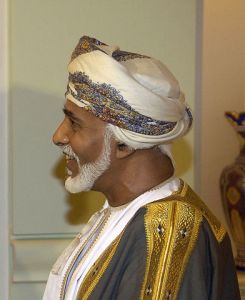Oman’s success over the last half century is at risk of slowing down in the coming years. Having made a name for itself as a stable and successful Middle Eastern country, this nation is growing increasingly close to a dangerous political and economic unknown. It is a country that largely withstood the Arab Spring, but without an obvious successor to the current Sultan and with dwindling oil reserves, Oman’s citizens are being led towards a foggy future.
The Sultan is looking for a successor, while diversifying the economy. Both are hard in an Oman built on popular monarchism and oil dependency
Oman has seen marked success since Qaboos bin Said Al Said overthrew his father in 1970 and began an aggressive modernisation programme. It has won several UNDP Public Services awards, including the ‘nation most improved during the preceding 40 years’, and has been widely recognised as a rare example of a strong, popular and resilient absolute monarchy. With a GDP per capita close to that of New Zealand and a strong relationship with both the West and its Middle Eastern neighbours, it would appear that Qaboos bin Said Al Said has struck upon a winning formula for Oman.
Nonetheless, Omani strength is derived primarily from its oil reserves and its popular leader, of which neither are eternal. Oman has recognised the need to diversify its economy and has set an ambitious aim to reduce the contribution of oil to the Omani economy from 45% to 9% of GDP by 2020. Furthermore, a recent plan has been announced to transform the fishing village of Duqm, 280 miles south of Muscat, into a vast port and international business hub. It is expected that this development will create tens of thousands of new jobs whilst also thriving as a result of its strategic position as oil traders seek to avoid the Strait of Hormuz. Although welcome economic developments like these are being initiated, the economic changes are being offset by increasing welfare spending, schemes to increase employment and economic benefits to the population that were introduced after a wave of protests in January 2011. Unemployment remains a problem at 15% and with the majority of jobs going to foreign workers, young Omani’s are demanding more from the Sultan.
Despite this, the Sultan has remained widely popular amongst his citizens. He has responded to the 2011 protests with reforms, benefit schemes and the creation of municipal elections in 2012. With a combination of these recent reforms and his historical record as the harbinger of Omani development, his citizens are remaining loyal to him despite widespread threats to Arab monarchies throughout the Middle East. Nonetheless, concern over who will eventually succeed the Sultan is increasing. With no brothers and no children there is no obvious successor. If a replacement is not chosen by the Royal Family Council elect within three days of the Sultan’s death, the Sultan’s predetermined heir will be selected. However, the lack of an obvious successor may result in infighting within the royal family and a failure to accept the legitimacy of the eventual successor, potentially leading to instability through a population less tolerant to their lack of political freedoms.
Oman’s economic success since 1970 is at risk unless the economy becomes less reliant on its oil reserves. Its strategic position and stability is currently of great benefit to it given the chaos that exists elsewhere in the region. If the economy starts to stagger, as oil reserves decline, the Omani population may become dissatisfied. Although discontent, for now, appears to be limited and popularity of the Sultan remains high, this may not be the case if a new, contested leader comes onto the scene. If Qaboos Said Al Said is the benevolent and progressive leader that many have hailed him to be, he must demonstrate that a suitable heir exists to avoid causing instability and political unrest during the transition between Sultans. It would seem a great loss to endanger the impressive growth that the country has witnessed since 1970.











